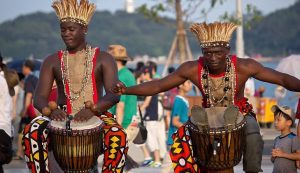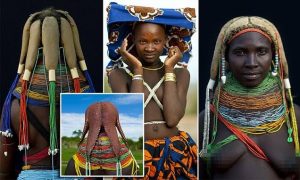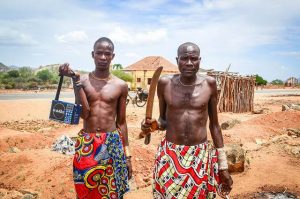Angola is a country of 482,625 square miles (approximately 1.25 million square kilometers) in western Africa, south of the Equator. There are great variations in climate and geography, including rain forests in the north, drier coastal lands, the fertile central highlands, sandy soils in the east, and desert zones in the Kunene (Cuene) and Kuando Kubango provinces.

Apart from large rivers such as the Zaire, Kwanza (Cuanza), Kunene, Kubango (Cubango), Zambezi, and Kuando, there are many smaller rivers, some of which are not perennial. The climate is characterized by a rainy season and a dry season whose timing and intensity differ in the various regions.
Angola borders Namibia to the south, the Atlantic Ocean to the west, Zambia to the east, and the Republic of Congo to the north. The oil-rich enclave of Cabinda lies north of the Zaire river.
The official language is Portuguese. Many Angolans are bilingual, speaking Portuguese and one or several African languages. In nearly all cases this is a Bantu language; those speaking a Khoisan language number less than 6,000. Six of the Bantu languages were selected as national languages: Chokwe, Kikongo, Kimbundo, Mbunda, Oxikuanyama, and Umbundu. Many people are able to understand one or more of the national languages, but some forty languages are spoken.

Present-day Angola is a construct designed by European politicians at the Conference of Berlin in 1885. Before that time, the area was inhabited by people with different political traditions, ranging from decentralized mobile groups to autocratic kingdoms.
The Kongo, Ndongo, and Ovimbundu kingdoms had early contact with the Portuguese, who in the sixteenth century created colonies on the coast. Wars fought against the immigrant Portuguese, such as that waged by Queen Njinga of the Ndongo kingdom, often have been interpreted in a nationalistic framework. For centuries the communities in this area were affected by the Atlantic slave trade. Portuguese, mestiço, (person of mixed descent) and African merchants and middle men sold millions of slaves who were transported to the Americas on Dutch and Portuguese vessels. Although the slave trade was stopped in the 1880s, internal slavery continued into the twentieth century.
After the Conference of Berlin, Portuguese colonialism took on a very different character. Through a slow and halting process that met with much local resistance, the Portuguese attempted to expand their control over the interior of the country and enforce a colonial system with taxation and forced labor.
After the installation of autocratic rule in Portugal, repression in the colonies became even worse than in the past. The legacy of the colonial divide-and-rule tactics is still felt.

The war for liberation started in 1961 with rebellions in Luanda and the northern region. The anticolonial war ended after Portuguese soldiers, tired of war in the colonial territories, staged a coup in Portugal in 1974. On 11 November 1975, Angola became an independent country. Before that date, fighting had broken out between the three major nationalist parties: the National Front for the Liberation of Angola (FNLA), MPLA, and UNITA. After independence, UNITA received support from South African troops and was later backed by the United States, while the MPLA came to depend largely on Russian and Cuban aid.
This division runs through the country’s recent history. With Angola’s involvement in the war in the Congo and with that war spilling into Namibia and Zambia, the war has taken on international dimensions.
Angola is relatively urbanized because in the 1980s many people sought refuge in the safer urban areas. The musseques, informal settlements around Luanda that are home to nearly a quarter of the population stand in sharp contrast to the modern city center.
For people in the countryside, living conditions are very different, although rectangular houses with corrugated iron roofs and zinc are replacing the traditional round wattle-and-daub (straw and mud) houses. Some urban areas are overcrowded, while other regions are almost uninhabited. As it is often dangerous to travel by road or railway, transportation and mobility are a problem. In the 1980s cheap airfares even led to regional trading networks based on transport by air.
Angola is a potentially rich country. Petroleum in the Cabinda enclave; diamonds in Lunda; and iron, phosphates, copper, gold, bauxite, and uranium in the other provinces are some of the natural resources. In comparison with other sub-Saharan countries, Angola is industrialized to a considerable degree and has a relatively high income per capita. Oil (90 percent of exports) is
especially important. Most of these resources are used to finance the military, however, as Angola has a war economy. Only those who have a stake in the war benefit from this system; for most people it means hunger. UNTA (National Union of Angolan Workers), for a long time the only effective labor organization, has been important in the redirection of the economy but rarely manages to represent workers’ interests adequately and is strongly connected with the government party. A rival labor organization was established in 1996.
Angola is a presidential republic. Until the 1990s, the MPLA monopolized the central state, and, despite the existence of government institutions, presidential powers were extensive. The MPLA leader, Agostinho Neto, was president until his death in September 1979, after which Eduardo dos Santos took over. Since independence, the power center has been rivaled by Jonas Savimbi, the leader of UNITA.
The formal government changed in 1992 from a socialist, one-party system to a multiparty, free market system. Many parties have been founded since then, apart from the MPLA and UNITA, but only the revived FNLA continues to have an impact. In April 1997, UNITA joined the government, but it was suspended in August 1998 for failing to observe the peace agreements signed in Lusaka.
The parties began fighting again, and the government won considerable terrain from UNITA. UNITA has become internationally isolated, and the whereabouts of Savimbi is unclear, although UNITA continues to buy weapons through the illegal diamond trade.
A number of UNITA defectors, including some in leadership functions, have formed a group called UNITA-renovada and are calling for adherence to the Lusaka protocols. The government announced elections for late 2001, but there is no guarantee that they will be held, or will be free and fair. Cometosouthernafrica update.
